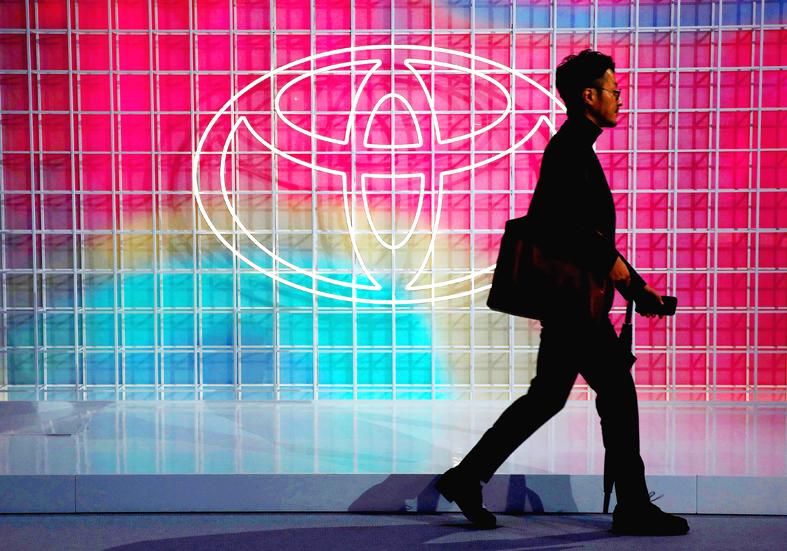Toyota Motor Corp says it will roll out two new battery-electric vehicles and one plug-in gasoline-electric hybrid in the US this year as the parade of new electric vehicles continues.
The company gave few specifics on the vehicles during a presentation on Wednesday, but said one electric vehicle would be a sports utility vehicle (SUV).
Toyota said it has a goal of having 40 percent of its new vehicle sales be electrified by 2025 and nearly 70 percent by 2035. It is also developing dedicated underpinnings to be used in future electric vehicles.

Photo: Reuters
Toyota broke from other automakers — and possibly the administration of US President Joe Biden — in calling for a diversity of electrified vehicles to reduce carbon emissions, rather than putting policies in place that require those powered solely by batteries.
The company, which pioneered the gasoline-electric hybrid, said its research shows that plug-in hybrids can be as clean as, and less costly than, full battery-electric vehicles, depending on the cleanliness of electric power generation in a particular region. Also, metals such as lithium must be mined for use in batteries, and the mining process creates pollution, Toyota said.
“We believe the fastest way to lower greenhouse gases in the transportation sector is to offer drivers lower carbon choices that meet their needs,” Toyota chief scientist Gill Pratt said.
Pratt said it does not make sense to have a huge battery that can take a vehicle 300 miles (480km) when the average US round-trip commute is 52km.
“You end up carrying around a lot of extra battery mass,” he said.
It is best to have a diversity of solutions like Toyota offers, such as full hybrids, plug-in hybrids, battery electric and hydrogen-fuel-cell vehicles, Pratt said.
Wednesday’s announcement comes as automakers continue to roll out new electric vehicles, even though fully electric vehicles were less than 2 percent of US new vehicle sales last year.
It also comes as the Biden administration moves toward adding a half-million electric vehicle charging stations and tries to swap out much of the federal vehicle fleet with electric vehicles.

Semiconductor shares in China surged yesterday after Reuters reported the US had ordered chipmaking giant Taiwan Semiconductor Manufacturing Co (TSMC, 台積電) to halt shipments of advanced chips to Chinese customers, which investors believe could accelerate Beijing’s self-reliance efforts. TSMC yesterday started to suspend shipments of certain sophisticated chips to some Chinese clients after receiving a letter from the US Department of Commerce imposing export restrictions on those products, Reuters reported on Sunday, citing an unnamed source. The US imposed export restrictions on TSMC’s 7-nanometer or more advanced designs, Reuters reported. Investors figured that would encourage authorities to support China’s industry and bought shares

FLEXIBLE: Taiwan can develop its own ground station equipment, and has highly competitive manufacturers and suppliers with diversified production, the MOEA said The Ministry of Economic Affairs (MOEA) yesterday disputed reports that suppliers to US-based Space Exploration Technologies Corp (SpaceX) had been asked to move production out of Taiwan. Reuters had reported on Tuesday last week that Elon Musk-owned SpaceX had asked their manufacturers to produce outside of Taiwan given geopolitical risks and that at least one Taiwanese supplier had been pushed to relocate production to Vietnam. SpaceX’s requests place a renewed focus on the contentious relationship Musk has had with Taiwan, especially after he said last year that Taiwan is an “integral part” of China, sparking sharp criticism from Taiwanese authorities. The ministry said

CHANGING JAPAN: Nvidia-powered AI services over cellular networks ‘will result in an artificial intelligence grid that runs across Japan,’ Nvidia’s Jensen Huang said Softbank Group Corp would be the first to build a supercomputer with chips using Nvidia Corp’s new Blackwell design, a demonstration of the Japanese company’s ambitions to catch up on artificial intelligence (AI). The group’s telecom unit, Softbank Corp, plans to build Japan’s most powerful AI supercomputer to support local services, it said. That computer would be based on Nvidia’s DGX B200 product, which combines computer processors with so-called AI accelerator chips. A follow-up effort will feature Grace Blackwell, a more advanced version, the company said. The announcement indicates that Softbank Group, which until early 2019 owned 4.9 percent of Nvidia, has secured a

TECH SECURITY: The deal assures that ‘some of the most sought-after technology on the planet’ returns to the US, US Secretary of Commerce Gina Raimondo said The administration of US President Joe Biden finalized its CHIPS Act incentive awards for Taiwan Semiconductor Manufacturing Co (TSMC, 台積電), marking a major milestone for a program meant to bring semiconductor production back to US soil. TSMC would get US$6.6 billion in grants as part of the contract, the US Department of Commerce said in a statement yesterday. Though the amount was disclosed earlier this year as part of a preliminary agreement, the deal is now legally binding — making it the first major CHIPS Act award to reach this stage. The chipmaker, which is also taking up to US$5 billion